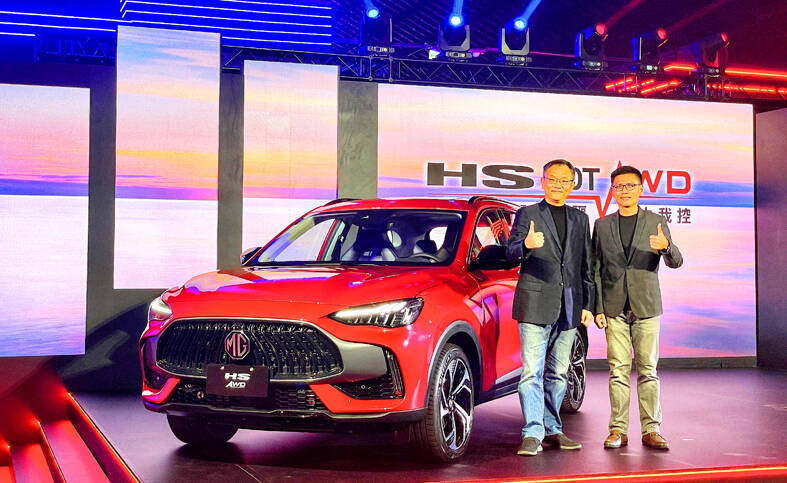To prevent Chinese auto parts from entering Taiwan in a piecemeal fashion, the Ministry of Economic Affairs (MOEA) has introduced a new policy on domestic vehicle assembly, which requires the proportion of local parts to rise progressively to 35 percent three years after their licensing.
MOEA Industrial Development Administration director Yang Chih-chin (楊志清) talked about the new measure during an interview on Thursday with the Liberty Times, the Taipei Times’ sister newspaper.
The new policy, which went into practice early this month, requires imported cars to increase their share of locally made parts to 20 percent in the first year of listing, 30 percent in the second year and 35 percent from the third year onward, Yang said.

Photo: Amy Yang, Taipei Times
The incremental design is intended to protect local autoparts suppliers from unfair competition by Chinese car companies that are reportedly dumping cars worldwide to resolve a severe supply glut, the official said.
The unfair trade practice has raised concern in Europe, the US and other markets whose authorities are drawing responsive measures and raising tariffs to level the playing field, he said.
The new policy is targeted at four kinds of automakers, namely pure Chinese car brands, cars from joint ventures with Chinese partners, car brands acquired by Chinese firms and foreign car brands that are manufactured in China, Yang said.
The introduction to the local market by China Motor Corp (中華汽車) of an MG HS sport utility vehicle from a Shanghai automaker has drawn the attention of lawmakers and has sped up the new policy, Yang said.
The Chinese automaker acquired the British car company MG, which changed owners several times over the past century.
The MG HS model ranked eighth-most popular in Taiwan by measure of new car sales, which spiked to an unprecedented 476,000 last year, as the market emerged from the COVID-19 pandemic, Yang said.
The ministry said it decided on the three-year buffer after factoring in practical considerations that some cars at issue have gone through their manufacturing and design stages, the official said.
The 35 percent cap would serve to protect Taiwanese auto part makers, while giving room for free competition, he said.
Taiwanese firms are competitive in making car bumpers, headlights, batteries and other electric components that have gained rising importance in electric vehicles, Yang said, adding that several companies collaborate closely with international car brands.
At the same time, the government has poured money into helping local firms upgrade their research-and-development capacities as well as technology and manufacturing processes, the official said.

Semiconductor shares in China surged yesterday after Reuters reported the US had ordered chipmaking giant Taiwan Semiconductor Manufacturing Co (TSMC, 台積電) to halt shipments of advanced chips to Chinese customers, which investors believe could accelerate Beijing’s self-reliance efforts. TSMC yesterday started to suspend shipments of certain sophisticated chips to some Chinese clients after receiving a letter from the US Department of Commerce imposing export restrictions on those products, Reuters reported on Sunday, citing an unnamed source. The US imposed export restrictions on TSMC’s 7-nanometer or more advanced designs, Reuters reported. Investors figured that would encourage authorities to support China’s industry and bought shares

FLEXIBLE: Taiwan can develop its own ground station equipment, and has highly competitive manufacturers and suppliers with diversified production, the MOEA said The Ministry of Economic Affairs (MOEA) yesterday disputed reports that suppliers to US-based Space Exploration Technologies Corp (SpaceX) had been asked to move production out of Taiwan. Reuters had reported on Tuesday last week that Elon Musk-owned SpaceX had asked their manufacturers to produce outside of Taiwan given geopolitical risks and that at least one Taiwanese supplier had been pushed to relocate production to Vietnam. SpaceX’s requests place a renewed focus on the contentious relationship Musk has had with Taiwan, especially after he said last year that Taiwan is an “integral part” of China, sparking sharp criticism from Taiwanese authorities. The ministry said

CHANGING JAPAN: Nvidia-powered AI services over cellular networks ‘will result in an artificial intelligence grid that runs across Japan,’ Nvidia’s Jensen Huang said Softbank Group Corp would be the first to build a supercomputer with chips using Nvidia Corp’s new Blackwell design, a demonstration of the Japanese company’s ambitions to catch up on artificial intelligence (AI). The group’s telecom unit, Softbank Corp, plans to build Japan’s most powerful AI supercomputer to support local services, it said. That computer would be based on Nvidia’s DGX B200 product, which combines computer processors with so-called AI accelerator chips. A follow-up effort will feature Grace Blackwell, a more advanced version, the company said. The announcement indicates that Softbank Group, which until early 2019 owned 4.9 percent of Nvidia, has secured a

CARBON REDUCTION: ‘As a global leader in semiconductor manufacturing, we recognize our mission in environmental protection,’ TSMC executive Y.P. Chyn said Taiwan Semiconductor Manufacturing Co (TSMC, 台積電), the world’s biggest contract chipmaker, yesterday launched its first zero-waste center in Taichung to repurpose major manufacturing waste, which translates into savings of NT$1.5 billion (US$46 million) in environmental costs a year. The environmental cost savings include a carbon reduction benefit of 40,000 tonnes, equivalent to the carbon offset of over 110 Daan Forest Parks, the chipmaker said. The Taichung Zero Waste Manufacturing Center is part of the chipmaker’s greater efforts to reach its net zero emissions goal in 2050, aligning with the UN’s 12th Sustainable Development Goal. The center could reduce TSMC’s outsourced waste processing